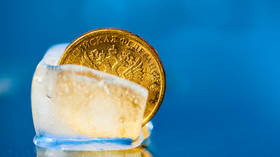Frozen fortune: Where is Russia’s $300 billion?

Nearly $300 billion worth of Russian forex reserves have been frozen by Western countries since March 2022. The EU has been looking into ways to legalize tapping profits from those funds, but Moscow has warned that any such move would constitute theft.
Russian officials have repeatedly said the confiscation of state and private assets goes against all the principles of free markets. Finance Minister Anton Siluanov has warned of “an absolutely symmetrical response,” noting that there are “sufficient assets” in ‘C-type’ accounts, specialized ruble-denominated bank accounts. Some of these include dividend reserve liabilities to counterparties from ‘unfriendly’ countries (those that support sanctions). Siluanov added that all of those assets are frozen, “the amount isn’t small,” and the proceeds from their use are significant.
The finance minister was echoed by Kremlin spokesman Dmitry Peskov, who stated Russia would challenge any confiscation in the courts. The seizure of Russian assets by Western countries would be “illegal” and “extremely dangerous” for the global financial system and the world economy, he continued, adding that any such a move would amount to theft. “If something is confiscated from us, we will look at what we will confiscate. We will do this immediately,” the Kremlin spokesman warned.
According to official estimates, the Russian central bank’s reserves decreased by 8.4% in 2022 after the assets were immobilized in G7 countries, the EU, and Australia. Notably, €210 billion ($232 billion) of Russia’s reserves are reportedly held in the EU. There is believed to be €191 billion in Belgium, €19 billion in France, and €7.8 billion in non-member Switzerland. The US has reportedly frozen around $5 billion of Russian state assets. The EU aims to mobilize €15 billion for Ukraine from the proceeds generated by frozen Russian assets, contingent on unanimous approval from all member states.
In July, a major EU clearing house, Belgium-based Euroclear, revealed that of the €2.28 billion it earned in the first half of 2023, it accrued more than €1.7 billion in profit from frozen Russian assets. It’s estimated that Euroclear holds €196.6 billion worth of Russian funds, the vast majority of which is owned by the Bank of Russia. On top of that, around 5 million private Russian investors saw their assets blocked in the accounts of international financial institutions. The value of frozen securities in private investors’ portfolios amounted to $3.4 billion as of July last year.
Western states have been mulling for months on how these funds could be confiscated and donated to Kiev, despite numerous warnings that such measures could jeopardize the credibility of the Western financial system and currencies. EU policymakers have been discussing the imposition of a windfall tax on profits generated from the immobilized funds, which are estimated to create some €3 billion in profits. According to Reuters, citing sources, the leaders of the G7 are expected to discuss a plan that would enable the seizure of frozen Russian assets when they meet in February.
Meanwhile, some EU member states have been against the idea of using frozen Russian funds. France, Germany, and Italy remain “extremely cautious” about the idea, and some EU officials “fear possible retaliation” from Moscow if its money is seized, according to a recent report by the Financial Times. The European Central Bank (ECB) has also warned against the measure, insisting that using the funds could jeopardize the euro’s reputation.
For more stories on economy & finance visit RT's business section













